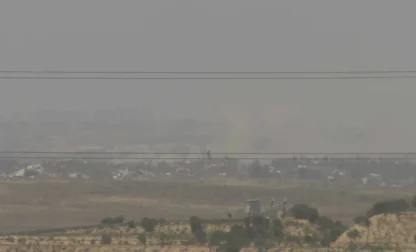NEW YORK (AP) — Four Associated Press journalists were honored with the George Polk Award for War Reporting for their searing coverage of Russia’s invasion of Ukraine, which Ukrainian officials have credited with saving many lives.
NEW YORK (AP) — Four Associated Press journalists were honored with the George Polk Award for War Reporting for their searing coverage of Russia’s invasion of Ukraine, which Ukrainian officials have credited with saving many lives.
AP videojournalist Mstyslav Chernov, photographer Evgeniy Maloletka, video producer Vasilisa Stepanenko and reporter Lori Hinnant were awarded for producing what the prize’s presenters said were “horrific narratives and images during the siege of Mariupol” a year ago.
“Our team’s eyewitness reporting from Mariupol represents journalism at its best,” AP Executive Editor Julie Pace said. “Without their work, the world would not know the horrors of the siege of Mariupol and the stories of its people. We’re so pleased that their reporting has been recognized.”
Chernov, Maloletka and Stepanenko hid from Russian forces until making a harrowing escape that involved passing through 15 enemy checkpoints. Ukrainian authorities said the AP’s reporting saved lives by helping open a humanitarian corridor for people to leave.
Polk Awards winners were announced Sunday in 15 categories. Three of the prestigious prizes, awarded by Long Island University, were for reporting on the war in Ukraine. The winners will be honored April 14 at a luncheon at the New York Athletic Club. Some will also participate in a seminar, “When Covering War Gets Personal,” April 13 at the university’s Brooklyn campus.
Lynsey Addario, a veteran war photographer for The New York Times, received the photojournalism award for her work in Ukraine — a photograph showing the bodies of a woman and her two children alongside a friend who lay dying moments after a mortar struck them as they sought to flee.
The Times was also honored for its reporting on the war, including deep-dive investigations into Russian President Vladimir Putin’s increasingly tight grip on power and the Russian military’s combat failures.
Polk Awards also went to journalists who exposed trouble at cryptocurrency giant FTX; the plundering of the Amazon rain forest; police and child labor abuses in Alabama; and Florida Gov. Ron DeSantis’ use of state resources to fly migrants from Texas to Martha’s Vineyard, Massachusetts.
A student journalist, Theo Baker of The Stanford Daily, was honored with a special award for uncovering questions about past scientific research conducted by the university’s president.
Politico was honored for reporting on the leaked draft of the U.S. Supreme Court’s ruling overturning Roe v. Wade. ProPublica’s Brett Murphy won for debunking “911 call analysis” used to implicate callers based on voice patterns. Kendall Taggart and a BuzzFeed team won for exposing declines in care after a private equity firm purchased homes for people with severe disabilities.
“We were deluged with so many worthwhile entries it was difficult to choose among them,” awards curator John Darnton said. “Interestingly, a lot of reporters went after large, thematic stories, like the role of private equity companies in buying up hospitals, private homes and apartment complexes. And the war in Ukraine produced superb war reporting, done at great peril.”
Other winners included: Eliza Shapiro and Brian Rosenthal of The Times, for detailing how New York’s Hasidic yeshivas failed to provide students with a basic education; CNN’s Shimon Prokupecz for reporting on the failed law enforcement response to a school shooting in Uvalde, Texas; Al Jazeera for an examination of the killing of journalist Shireen Abu Akleh in the West Bank; and Alex Perry, who reported in Outside Magazine about a 2021 ISIS attack that killed hundreds of people in northern Mozambique.
“The fearless work of these distinguished journalists proves that diligent reporting will always have the power to affect positive change throughout the world,” Long Island University President Kimberly Cline said.
The Polk Awards were created in 1949 in honor of CBS reporter George W. Polk, who was killed while covering the Greek civil war.


